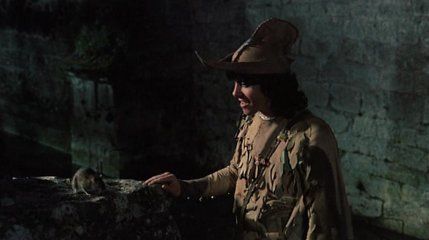It's just in the nature of things that men and rats should be enemies.

For his follow-up to the immaculately costumed fairy tale Donkey Skin, Jacques Demy tackled one with a bit more grubbiness to it -- the Grimm Brothers' "The Pied Piper of Hamelin." Released in 1972, The Pied Piper stars Donovan (in his first and only leading role, following his cameo as "Singer in Youth Hostel" in 1969's If It's Tuesday, This Must Be Belgium) as a wandering minstrel who hooks up with a family of traveling players searching for a town in Northern Germany to perform in that hasn't been ravaged by the plague. See, it's the 1349 -- the "Year of the Black Death," as the opening caption of this G-rated family film makes plain. Considering all that it encompasses, that rating is highly suspect, but I suppose the MPAA was a bit more lax when it came to determining what was suitable for a general audience back then.
In this case, what it considered suitable is a story where one man is burned at the stake (albeit not as grotesquely as in Ken Russell's The Devils, released the year before), another expires after contracting the plague, still another is called a bastard multiple times, and a girl is described as a whore as she is in the process of being married off to the aforementioned bastard (who, it has to be said, is much older than she is) as part of what amounts to a business transaction. Oh, and did I neglect to mention the scene where the traveling players arrive at a town where the Black Death has preceded them and find rats nibbling away at a few skeletons? Fun for the whole family! Clearly, Demy and his collaborators (including cinematographer Peter Suschitzky) weren't interested in coddling anybody. Rather, they fashioned a realistic medieval film comparable to Pasolini's The Canterbury Tales, made the same year, even as it keeps the violence to a minimum and leaves the sex out of it completely.
In addition to Donovan, the film is headlined by Jack Wild (late of Oliver! and Sid & Marty Krofft's H.R. Pufnstuf) as Gavin, the lame assistant to alchemist Melius (Michael Hordern), who's on the receiving end of a distressing amount of anti-Semitism, Donald Pleasence as Hamelin's resident cash-strapped Baron, and John Hurt as his petulant, war-mongering son Franz. Toss in Roy Kinnear as the town's harried Burgermeister, Diana Dors as his lascivious wife (who, it's hinted, is carrying on an affair with Franz, but all we see of it is one brief, chaste clinch), and Peter Vaughan as the red-robed Bishop who keeps the pressure on both the Baron and the Burgermeister to continue building a grand cathedral even though the town is flat broke, and introduce Cathryn Harrison as the Burgermeister's daughter Lisa, who's the one being wedded to Franz so his father can get his hands on her dowry, and that's your cast. Alas, Lisa isn't allotted much in the way of a personality, but that matches the amount of agency she has in the story. And the one time we see her interacting with someone her own age -- Gavin, who's harboring an obvious crush on her -- she's completely haughty around him, which means she isn't the total goody-goody she appears to be.
As there isn't very much to the original story, Demy and his co-writers, Andrew Birkin and Mark Peploe, have to do a whole lot of inventing (as the subplots about the cathedral and Melius's persecution can attest). In fact, about an hour of the 90-minute film elapses before the Pied Piper offers to rid Hamelin of its rats for a thousand guilders, which the Burgermeister weasels out of paying once the job is done. And the town's officials are too preoccupied with the trial and execution of Melius (both of which take place before a panel of red-hooded inquisitors) to notice that, in retribution, the Piper has taken their children away. Then again, he's probably doing the kids a favor since the plague breaks out at the very moment the town's one man of science (who insists Gavin wash his hands after handling one of the rats, which probably saves his life) is being burned to a cinder in the name of ignorance. No matter how you slice it, that's pretty strong meat for a film ostensibly aimed at children.